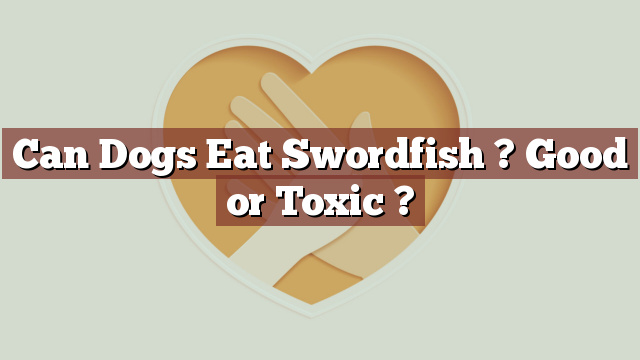Can Dogs Eat Swordfish? Good or Toxic?
Knowing which foods are safe for our furry companions is essential for their overall health and well-being. While dogs are primarily meat-eaters, it’s natural to wonder if they can enjoy seafood as well. In this article, we will explore whether swordfish is a suitable addition to a dog’s diet or if it poses any potential risks.
Nutritional Value of Swordfish for Dogs
Swordfish is a type of fish with a firm texture and a mild, slightly sweet flavor. It is known for being a good source of lean protein and various essential nutrients. This fish is rich in omega-3 fatty acids, which are beneficial for dogs’ skin, coat, and joint health. Additionally, swordfish contains significant amounts of vitamins D and B12, selenium, and potassium.
Is Swordfish Safe or Toxic for Dogs?
No, dogs should not consume swordfish. While it is true that some dogs may enjoy the taste of swordfish, it is important to prioritize their safety and well-being. Swordfish contains high levels of mercury, which can be toxic to dogs when consumed in large quantities. Mercury poisoning can lead to neurological issues, digestive problems, and even organ damage.
Scientific studies and veterinary experts strongly advise against feeding swordfish to dogs due to the potential risks associated with mercury accumulation. Even occasional consumption can be harmful, especially for small or sensitive dog breeds.
Potential Risks and Benefits of Feeding Swordfish to Dogs
As mentioned earlier, the main risk associated with feeding swordfish to dogs is mercury poisoning. Mercury is a heavy metal that can build up in an animal’s system over time, causing severe health problems. The symptoms of mercury poisoning in dogs include vomiting, diarrhea, muscle weakness, and difficulty breathing. Prolonged exposure to mercury can have long-term detrimental effects on a dog’s overall health.
While swordfish does offer some nutritional benefits, such as being a good source of protein and omega-3 fatty acids, these advantages are outweighed by the potential risks. It is crucial to seek alternative sources of lean protein and omega-3 fatty acids that do not pose any harm to your furry friend.
What to Do If Your Dog Eats Swordfish
If your dog accidentally consumes swordfish, it is important to monitor them closely for any signs of distress or illness. If your dog shows symptoms such as vomiting, diarrhea, or difficulty breathing, it is recommended to seek immediate veterinary attention. The veterinarian will be able to provide appropriate treatment and guidance based on your dog’s specific situation.
Conclusion: Should Dogs Eat Swordfish?
In conclusion, dogs should not eat swordfish due to the high risk of mercury poisoning. While swordfish does offer some nutritional benefits, the potential dangers outweigh any advantages it may have. As responsible pet owners, it is our duty to ensure the safety and well-being of our canine companions by providing them with a balanced and appropriate diet. If you have any concerns or questions about your dog’s diet, it is always best to consult with your veterinarian for professional advice.
Thank you for investing your time in exploring [page_title] on Can-Eat.org. Our goal is to provide readers like you with thorough and reliable information about various dietary topics. Each article, including [page_title], stems from diligent research and a passion for understanding the nuances of our food choices. We believe that knowledge is a vital step towards making informed and healthy decisions. However, while "[page_title]" sheds light on its specific topic, it's crucial to remember that everyone's body reacts differently to foods and dietary changes. What might be beneficial for one person could have different effects on another. Before you consider integrating suggestions or insights from "[page_title]" into your diet, it's always wise to consult with a nutritionist or healthcare professional. Their specialized knowledge ensures that you're making choices best suited to your individual health needs. As you navigate [page_title], be mindful of potential allergies, intolerances, or unique dietary requirements you may have. No singular article can capture the vast diversity of human health, and individualized guidance is invaluable. The content provided in [page_title] serves as a general guide. It is not, by any means, a substitute for personalized medical or nutritional advice. Your health should always be the top priority, and professional guidance is the best path forward. In your journey towards a balanced and nutritious lifestyle, we hope that [page_title] serves as a helpful stepping stone. Remember, informed decisions lead to healthier outcomes. Thank you for trusting Can-Eat.org. Continue exploring, learning, and prioritizing your health. Cheers to a well-informed and healthier future!

